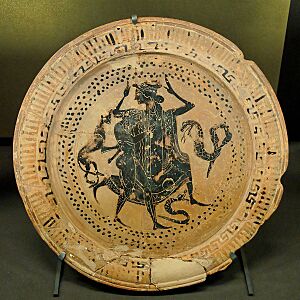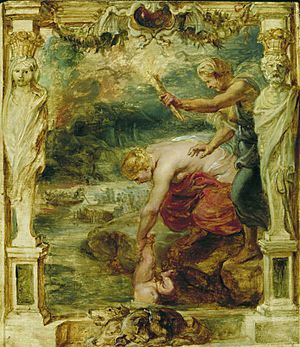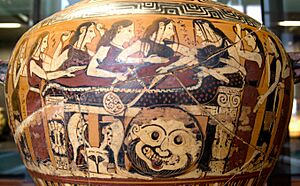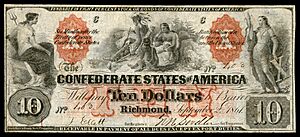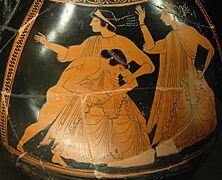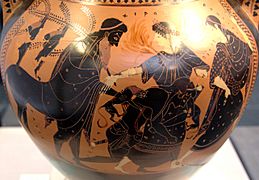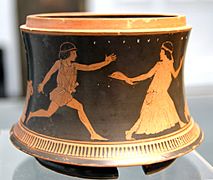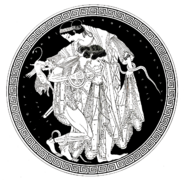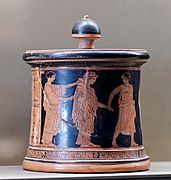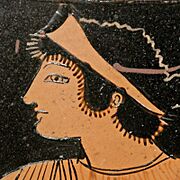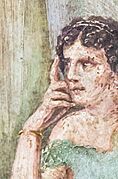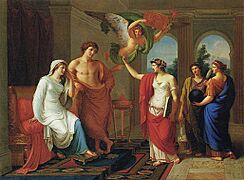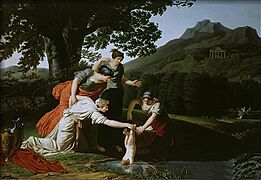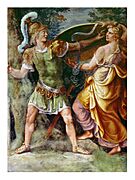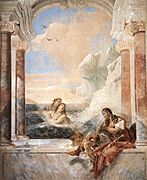Thetis facts for kids
Quick facts for kids Thetis |
|
|---|---|
| Member of the Nereids | |
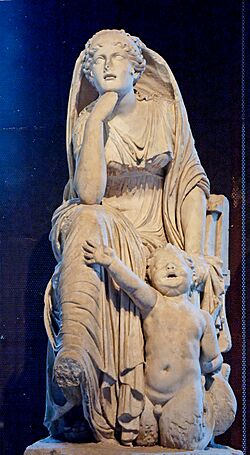
Statue of Thetis with a triton, Roman copy
|
|
| Abode | the Sea |
| Personal information | |
| Consort | Peleus |
| Children | Achilles |
| Parents | Nereus and Doris |
| Siblings | Nereids, Nerites |
Thetis (pronounced THEEH-tiss or THEH-tiss) is an important figure in Greek mythology. She had different roles in ancient stories. She was mostly known as a sea nymph and a goddess of water. Thetis was one of the 50 Nereids, who were daughters of the old sea god Nereus.
In classic myths, Thetis was the daughter of Nereus and Doris. She was also the granddaughter of Tethys. Sometimes, Thetis was seen as the leader of the Nereids. She was also sometimes linked to Metis, another powerful goddess.
Some ancient writings suggest that Thetis was one of the first gods worshipped in Archaic Greece. Most records from that time are lost. However, one old poem by Alcman says that Thetis was the creator of the universe. Writers like Pausanias also wrote that people continued to worship Thetis as a goddess in some areas.
In the famous stories of the Trojan War, Thetis's wedding was a key event. Her marriage to the Greek hero Peleus led to the birth of their son, Achilles. This wedding also played a part in starting the Trojan War. One of her special names was Halosydne. This name means "sea-nourished" or "sea-born goddess."
Contents
Thetis: A Powerful Sea Goddess
Most stories about Thetis focus on her being the mother of Achilles. However, there is proof that she was more important in Archaic Greece. People might have seen her as a central sea-goddess. Her name, Thetis, comes from an old Greek word meaning "to set up" or "to establish." This suggests she had an early role in how cities were formed.
After Achilles died, Thetis did not need to ask Zeus to make her son immortal. She already had a good relationship with Zeus. This was because Thetis had helped him in a fight against three other gods. She took Achilles to the White Island in the Black Sea. This island was like another Elysium, a place for heroes after death. People continued to worship Achilles there for a long time.
Thetis and Other Gods
Ancient texts say that both Zeus and Poseidon wanted to marry Thetis. But she was married to the human Peleus instead. This happened because of a prophecy. The prophecy said that Thetis's son would become greater than his father. This meant her son could become more powerful than Zeus or Poseidon. So, Thetis was seen as a very powerful figure. She could even change the order of the gods.
When Hephaestus, the god of blacksmiths, was thrown from Mount Olympus, Thetis helped him. The Oceanid Eurynome and Thetis, a Nereid, caught him. They let him stay on the island of Lemnos. Hephaestus worked for them as a smith in a cave. This story shows Thetis helping other gods.
Homer's Iliad also tells how Thetis helped other gods. Diomedes remembered that when Dionysus was chased away, he found safety with Thetis. He hid in the Erythraean Sea with her. These stories show Thetis as a very strong goddess. She was even more powerful than other gods in some ways.
Once, Thetis and Medea argued about who was more beautiful. They asked Idomeneus from Crete to judge. He said Thetis was the most beautiful. Medea became angry and cursed all people from Crete. She said they would never speak the truth.
Thetis's Marriage to Peleus
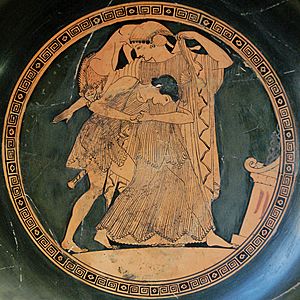
Zeus had heard a prophecy that Thetis's son would be greater than his father. Zeus himself had taken power from his own father. To make sure Thetis's son would have a human father, Zeus and Poseidon arranged for her to marry Peleus. Peleus was a human hero and the son of Aeacus. But Thetis did not want to marry him.
Proteus, an old sea-god, told Peleus how to make Thetis marry him. Peleus had to find Thetis when she was asleep. Then, he had to hold her tightly so she could not escape. Thetis tried to change her shape to get away. She turned into fire, water, a fierce lion, and a snake. But Peleus held on tight. Finally, she gave up and agreed to marry him. Thetis and Peleus had a son named Achilles. Achilles later became king of the Myrmidons.
The wedding of Thetis and Peleus was a grand event. It was held on Mount Pelion, near the cave of Chiron. Many gods attended the celebration. Apollo played music, and the Muses sang. Pindar said that Chiron gave Peleus a special spear. This spear was polished by Athena and had a blade made by Hephaestus. The Olympian goddesses also brought gifts. Aphrodite gave a bowl, Hera gave a cloak, and Athena gave a flute. Poseidon gave Peleus two immortal horses, Balius and Xanthus.
However, Eris, the goddess of disagreement, was not invited. In anger, she threw a golden apple into the party. The apple was marked "to the fairest." This event led to the Judgement of Paris and eventually caused the Trojan War.
The poet Apollonius of Rhodes wrote that Thetis tried to make her son Achilles immortal. At night, she would burn away his human parts in a fire. During the day, she would rub him with ambrosia, the food of the gods. One night, Peleus saw her doing this and cried out.
Thetis heard him. She threw the screaming child to the ground. Then, like a swift dream, she left the hall and jumped into the sea. She was very angry and never returned to Peleus.
Some myths say that because Peleus interrupted her, Thetis could not make Achilles fully invulnerable. His heel, where she held him, was not protected. Another version of the story, by the Roman poet Statius, says Thetis dipped Achilles in the River Styx. This river flowed through Hades, the land of the dead. But the heel she held was not touched by the water, so it remained unprotected. This is where the phrase "Achilles' heel" comes from.
Peleus gave Achilles to Chiron to raise. A prophecy said that Achilles would either have a long but boring life, or a glorious but short one. When the Trojan War began, Thetis was worried. She hid Achilles, dressed as a girl, at the court of King Lycomedes on the island of Scyros. Achilles was already known for his speed and fighting skills.
Calchas, a priest, said that the great soldier Achilles was needed for the war. So, Odysseus was sent to find him. Scyros was close to Achilles's home, and Lycomedes was a friend of Thetis. Odysseus suspected Achilles was there. He came up with a plan. He raised a fake alarm that they were under attack. Odysseus knew that Achilles would instinctively grab his weapons and armor, revealing himself.
Seeing that she could no longer stop her son from fighting, Thetis asked Hephaestus to make him new armor. Hephaestus made a beautiful shield, a breastplate, a helmet, and leg guards for Achilles.
Thetis in the Trojan War

Thetis played a very important role in the Trojan War. Her wedding to Peleus was where the Judgement of Paris happened, which started the war. Thetis also often influenced the actions of the Twelve Olympians and her son, Achilles.
Homer's Iliad begins nine years into the Trojan War. It starts with Agamemnon, the leader of the Achaeans, and Achilles arguing. They were fighting over Briseis, a woman Achilles had captured. Achilles felt disrespected and prayed to Thetis, his mother, for help. She told Achilles to wait to fight again until she spoke with Zeus. Achilles listened to his mother. When Thetis finally spoke to Zeus, she convinced him to agree to her wishes. Zeus sealed his promise by bowing his head, which was his strongest oath.
After Achilles's friend Patroclus died, Thetis came to comfort Achilles. She promised to return with new armor made by Hephaestus, the gods' blacksmith. She told Achilles not to fight until she came back. While Thetis was gone, Iris, the gods' messenger, came to Achilles. She was sent by Hera and told him to rejoin the fighting. But Achilles refused, remembering his mother's words.
Thetis went to Hephaestus and begged him to make armor for Achilles. He made a wonderful shield, a breastplate, a helmet, and greaves (leg armor). When Thetis returned to Achilles with the new armor, he was still sad about Patroclus. Achilles worried that Patroclus's body would decay. Thetis reassured him. She put ambrosia and nectar in Patroclus's nose to protect his body from decay.
After Achilles used his new armor to defeat Hector in battle, he kept Hector's body to dishonor it. But after nine days, the gods called Thetis to Mount Olympus. They told her she must go to Achilles and tell him to return Hector's body. The gods were angry that the body had not been given back. Thetis did as she was told. She convinced Achilles to return the body for a ransom, which helped him avoid the gods' anger.
Worship of Thetis
Most historical records show that Thetis was not widely worshipped as a goddess. However, there was an exception in Laconia, a region in Greece. The writer Pausanias learned that there were priestesses of Thetis in ancient times. There was a cult that worshipped a wooden statue of Thetis. Later, a temple was built for her. In the second century AD, she was still worshipped with great respect there.
The Lacedaemonians were fighting the Messenians. Their king, Anaxander, captured some women, including Cleo, a priestess of Thetis. Anaxander's wife asked for Cleo. She found out Cleo had the wooden statue of Thetis. Because of a dream, she set up Cleo in a temple for the goddess. This wooden statue of Thetis was kept secret.
In a short poem by the Spartan poet Alcman from the seventh century BC, Thetis appears as a demiurge. This means she was seen as a creator. She began her creation with "path" and "marker." Third was "darkness," and then the Sun and the Moon. Some scholars believe Thetis is closely linked to Metis. Metis was another shape-shifting sea-power. She was also loved by Zeus, but a prophecy said her son would be greater than his father.
Herodotus wrote that the Persians sacrificed to "Thetis" at Cape Sepias. Herodotus likely identified a sea-goddess from another culture (probably Anahita) with the Greek "Thetis."
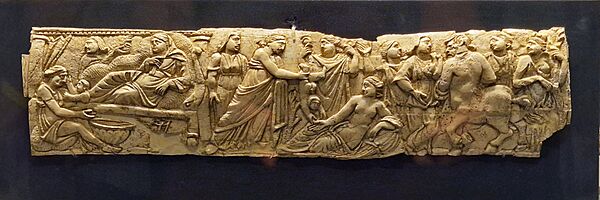
Thetis in Modern Works
- Homer's Iliad mentions Thetis many times.
- Euripides's play Andromache (lines 1232–1272) features Thetis.
- Apollonius Rhodius's Argonautica (Book IV, lines 770–879) includes her.
- The Bibliotheca (3.13.5) also mentions her.
- Francesco Cavalli's first opera, Le nozze di Teti e di Peleo (1639), is about Thetis's marriage to Peleus.
- WH Auden's poem The Shield of Achilles describes Thetis watching Achilles's shield being made.
- In 1939, the submarine HMS Thetis (N25) sank during trials. Ninety-nine people died.
- In the 1981 film Clash of the Titans, British actress Maggie Smith played Thetis. She was the main enemy of the hero Perseus.
- In 1999, British poet Carol Ann Duffy included a poem about Thetis in her collection The World's Wife.
- In the 2004 film Troy, British actress Julie Christie played Thetis.
- In 2011, American novelist Madeline Miller showed Thetis as a harsh goddess in The Song of Achilles.
- The 2018 novel The Silence of the Girls focuses on Briseis and Achilles's relationship with his mother.
- In 2019, Rachel Smythe's webcomic "Lore Olympus" features Thetis. She is Zeus's secretary and a friend of Minthe.
Gallery
Thetis, Peleus and Zeus
-
Thetis on an antique fresco in Pompeii, 1st century
Wedding of Peleus and Thetis
Thetis and Achilles
See also
 In Spanish: Tetis (nereida) para niños
In Spanish: Tetis (nereida) para niños
 | Stephanie Wilson |
 | Charles Bolden |
 | Ronald McNair |
 | Frederick D. Gregory |


